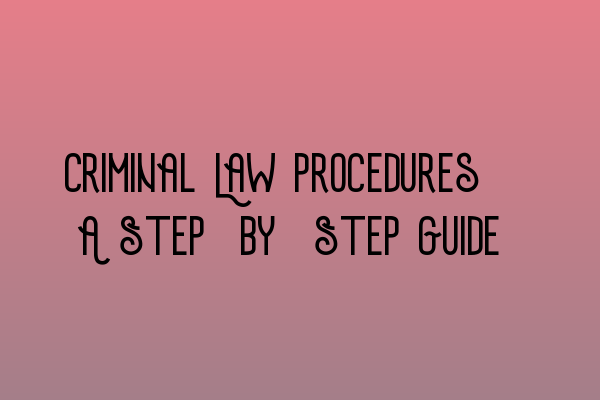Criminal Law Procedures: A Step-by-Step Guide
Welcome to SQE Criminal Law & Practice UK, where we provide comprehensive information on criminal law procedures. In this step-by-step guide, we will take you through the essential stages involved in criminal law cases, ensuring that you have a better understanding of the process. Whether you are studying for your SQE exams or simply looking to expand your knowledge, this guide is designed to be informative and easy to follow.
1. Investigation and Arrest
Every criminal law case begins with an investigation. Law enforcement agencies gather evidence, interview witnesses, and collect relevant information. Once enough evidence is gathered to support a reasonable belief that a crime has been committed, an arrest can take place. To learn more about the investigation stage, check out our article on SQE 1 Practice Exam Questions.
2. Booking and Bail
After the arrest, the suspect is taken to the police station for booking. This involves recording personal details, fingerprints, and photographs. Depending on the severity of the crime, the suspect may be eligible for bail. To understand the intricacies of the booking and bail process, read our article on SQE 1 Practice Mocks FLK1 FLK2.
3. Arraignment and Plea
Once the suspect has been booked, they are brought before a judge for arraignment. At this stage, the charges are read out, and the suspect is asked to enter a plea, either guilty or not guilty. If you wish to delve deeper into the arraignment and plea process, our SQE 2 Preparation Courses cover this topic extensively.
4. Discovery and Pre-Trial Motions
During the discovery phase, both the prosecution and defense exchange information and evidence. Pre-trial motions are legal arguments made by the attorneys to exclude or limit certain evidence or to dismiss charges. To get a better understanding of the discovery and pre-trial motions, explore our SQE 1 Preparation Courses.
5. Trial
The trial is where both the prosecution and defense present their cases before a judge and/or jury. Evidence is examined, witnesses are called, and legal arguments are made. To stay updated with the latest SRA SQE exam dates, visit our article on SRA SQE Exam Dates and prepare for your upcoming SQE assessments.
6. Sentencing and Appeals
After the trial, if the defendant is found guilty, a sentencing hearing takes place. The judge determines the appropriate punishment based on various factors. If either party wishes to contest the decision, they have the right to appeal. For more information on sentencing and appeals, our expert attorneys provide guidance as part of our SQE 2 preparation courses.
By following this step-by-step guide to criminal law procedures, you can enhance your knowledge and understanding of the legal system. Remember, staying up to date with relevant exams, mock quizzes, and preparation courses will further strengthen your expertise in criminal law.
For thorough practice exams, browse through our SQE 1 Practice Exam Questions. To assess your skills with mocks, avail our SQE 1 Practice Mocks FLK1 FLK2 package. If you’re preparing for the SQE 2 exams, explore our SQE 2 Preparation Courses. For comprehensive preparation covering both SQE 1 and SQE 2, our SQE 1 Preparation Courses are perfect. Stay updated with the latest SRA SQE exam dates by visiting our article on SRA SQE Exam Dates.
We hope this guide has been helpful to you in understanding the criminal law procedures. If you have any further questions or require professional assistance, do not hesitate to contact SQE Criminal Law & Practice UK. We are here to support you on your journey to becoming a successful legal professional.
